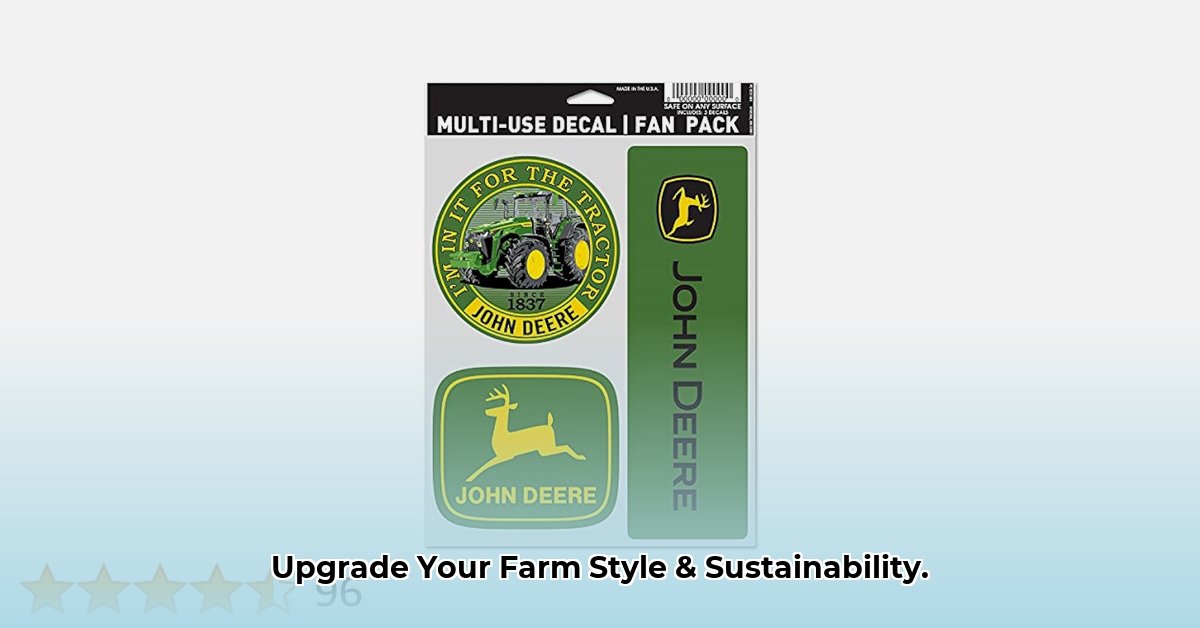
The iconic green and yellow of John Deere decals, frequently spotted at Tractor Supply stores, represents more than just brand recognition; it symbolizes a deep-rooted connection to agriculture and, increasingly, a commitment to sustainable farming practices. While the decals themselves don't directly cultivate crops, they serve as a visual marker within a community actively striving for environmentally responsible food production. This article explores the multifaceted landscape of sustainable agriculture, highlighting the challenges, innovative solutions, and the crucial role technology plays in securing a future of food security and environmental stewardship. For more on agricultural decals, check out this page on tractor decals.
The Growing Importance of Sustainable Agriculture
Sustainable agriculture is not merely a trend; it's a necessity. It entails producing food while preserving the planet's resources for future generations. This approach demands a long-term perspective, focusing on soil health, water conservation, biodiversity protection, and climate change mitigation. The continued viability of our food systems hinges on adopting these practices.
However, significant challenges persist. Water scarcity, exacerbated by climate change and inefficient irrigation, significantly impacts agricultural yields globally. The Food and Agriculture Organization of the United Nations (FAO) estimates that agricultural water withdrawal has increased by over 100% since 1950. [1] Soil degradation, resulting from intensive farming practices, diminishes soil fertility, affecting crop production and increasing the need for chemical fertilizers. Furthermore, the loss of biodiversity weakens the resilience of agricultural ecosystems, making them more vulnerable to pests and diseases. Climate change-induced extreme weather events further complicate the situation. How can we ensure continued food production in the face of these daunting challenges?
Tech to the Rescue: Precision Agriculture and its Impact
Technological advancements are transforming the agricultural landscape, offering innovative solutions to these age-old problems. Precision agriculture, enabled by GPS-guided machinery, soil sensors, and sophisticated data analytics, optimizes resource use and maximizes yields. Imagine tractors equipped with sensors meticulously adjusting water and fertilizer application based on real-time soil conditions, minimizing waste and maximizing efficiency. This is the transformative potential of precision farming.
Companies like John Deere are at the forefront of this technological revolution, developing cutting-edge equipment and software designed to enhance both efficiency and sustainability. While the decals themselves don't directly contribute to sustainable practices, they represent a brand deeply invested in technological advancements which support it. The presence of John Deere equipment often suggests an adoption of environmentally mindful farming methods, signaling a commitment to progress.
Practical Steps for Sustainable Farming
Sustainable farming isn't solely dependent on advanced technologies; a multitude of manageable, practical strategies can significantly contribute. These practices are readily adaptable by farmers of all scales:
Crop Rotation: Rotating different crops in a field restores soil fertility, reduces pest and disease pressure, and enhances biodiversity. This method strengthens soil ecosystems and reduces reliance on external inputs.
No-Till Farming: Minimizing soil disturbance through no-till farming preserves soil structure, reduces erosion, and improves water retention. This, in turn, improves soil health and reduces the need for extensive irrigation.
Integrated Pest Management (IPM): IPM integrates multiple pest control strategies, prioritizing preventative measures, biological controls, and targeted pesticide application only when absolutely necessary, minimizing environmental impact.
Efficient Irrigation Techniques: Techniques like drip irrigation deliver water directly to plant roots, minimizing water waste. Smart irrigation systems utilizing sensors and real-time data provide further optimization.
The Role of Government and Consumer Choices
Government policies play a pivotal role in encouraging and supporting sustainable agricultural practices. Subsidies, tax incentives, and regulations which promote environmentally friendly technologies and practices are essential for widespread adoption. Consumers also have a vital role to play. Actively seeking out and purchasing sustainably produced food creates increased market demand, prompting farmers to embrace eco-conscious practices.
John Deere's Commitment to Sustainable Practices
John Deere’s commitment to sustainability extends beyond marketing. They actively invest in research and development, creating technologies that reduce the environmental footprint of farming. From precision farming equipment to initiatives focused on water conservation and emissions reduction, their efforts are substantial and contribute to a more sustainable agricultural future. While a John Deere decal is not a straightforward guarantee of sustainability, it does typically suggest the adoption of more advanced, environmentally friendly methods.
The Future of Farming: A Sustainable Vision
The future of farming is intrinsically intertwined with sustainable practices. It involves a holistic approach that integrates environmental and economic considerations to ensure long-term food security. By embracing innovation, fostering collaboration across sectors, and supporting policies that prioritize sustainability, we can cultivate a more resilient and thriving agricultural future - one that provides food security while simultaneously protecting our planet.
[1] FAO. (n.d.). Water scarcity in agriculture. [Insert Appropriate FAO URL here] (This placeholder needs to be replaced with a real citation)